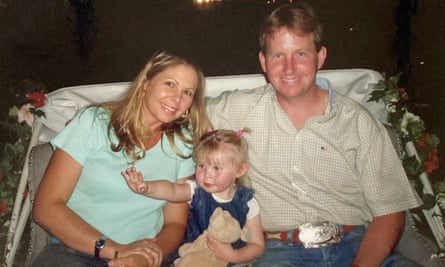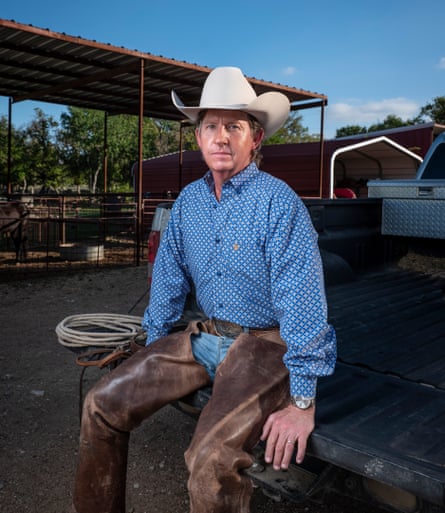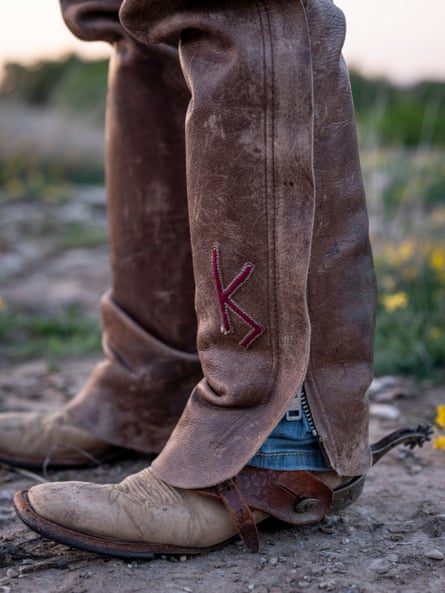
For Scott Knudsen, it was shaping up to be a good day. It was his daughter’s first birthday, and his wife Tracy had just called to say she had a surprise for him. Knudsen had been in town, fetching hay and running chores for their ranch in rural Texas. He thought Tracy might have got him another horse. But when he got home, it was even better: Tracy was there, with baby Hailey and they had washed his dirty tractor. Now, nearly 20 years later, still on the same ranch, Knudsen smiles at the memory. “Oh my goodness, it made me so happy.”
It was mid-afternoon, on a July day in 2005. Knudsen was 37 years old. In the distance there was a thunderstorm – he could see the rain clouds, 15 or so miles away – but where they stood there were blue-skies and calm. Several of their horses were out to pasture; there were chickens around, pecking at the dirt. Tracy handed Hailey to Knudsen to hold.
He remembers it as a contented moment: “It was one of those young-couple, happy moments; it was so peaceful. And then, just like that – it changed.”
Suddenly, a lightning bolt struck Knudsen, entering through his head and exiting through his left hand. He remembers bright light and “the loudest noise”. The horses ran for cover, while pipes that had been buried deep underground lurched to the surface. In their home, 300 yards (275m) from where they stood, the television blew out. Then, just as abruptly, the chaos passed.
Knudsen was still standing, but Hailey had somehow ended up in Tracy’s arms in the commotion. “I knew we’d been hit by lightning,” he says. “We started laughing.” There was just something ludicrous about it. “There were blue skies! How in the world could that have happened?”
In fact, lightning is one of nature’s most frequently occurring spectacles, with around 3m flashes globally every day – equating to 1.4bn strikes each year, or 44 strikes every second. In the US, about 40m lightning strikes hit the ground annually, according to the Centers for Disease Control and Prevention. Nonetheless, the odds of being struck are slim: less than one in a million. Of those unlucky ones, the majority – almost 90% – survive. In 15 years, from 2006 to 2021, 444 deaths from lightning were recorded across the entire US.
Knudsen is a fifth-generation Texan, born and raised in Georgetown, 75 miles away from Fredericksburg, his closest city. Now 54 years old, he appears on a video call as the quintessential cowboy, wearing a white Stetson that accentuates his tan, in front of a wall covered with bridles and reins.
Knudsen and his wife bought their ranch soon after learning she was pregnant with Hailey. Tracy was a “city girl”, he says, but Knudsen had grown up knowing how to read the land – how to watch the weather, which risks to take.
Lightning strikes were a known danger: Knudsen had once seen a tree get hit, instantly killing the cows beneath it. But that afternoon, there was no sign, no time to take cover.
After the impact, his brain felt like an old TV that had been unplugged. “You remember back in the old days, all those fuzzies and it would take a minute to reboot?” The three of them made their way back to the house, shell-shocked but apparently unharmed. “I thought I was OK,” says Knudsen. “I’m not trying to be a macho cowboy or anything – I just thought we were going to be fine, because I’ve had hard hits my whole life, doing what I do.”

Though her ears were ringing and her eyes smarting, Tracy left to go to pick up Hailey’s birthday cake from town, a half-hour drive away. “She wouldn’t have left me … but I said: ‘I’m fine’,” Knudsen says.“We were trying to celebrate Hailey, to be good parents.”
By the time Tracy got home, an hour or so later, Knudsen hadn’t moved. His head and hand felt as if they were burning: “I couldn’t do anything.” But he only realised something was seriously wrong when he saw Tracy’s horrified expression. The upper half of his face was solid black, “from here up,” Knudsen gestures to the bridge of his nose. “It just went south really quick after that.”
Knudsen only knows what happened next from Tracy’s retelling. The trauma of the event was still catching up to them and, seeking to call a hospital, Knudsen tried to dial using his computer keyboard and not the nearby phone. “I was all messed up,” he says. “Just totally fried.” The word is apposite. As sharply as lightning might split the horizon, in fact a bolt is only 2-3cm wide. This small channel, about the same width as a thumb, carries a charge so intense that its temperature is 30,000C: five times hotter than the surface of the sun.
It was touch and go as to whether they would make it to the hospital in Fredericksburg, Knudsen says – “it was bad; it was so bad” – but they did. A doctor gave the three of them a cursory checkup, but admitted she wasn’t sure what to do. “They didn’t know what to look for,” Knudsen recalls. “There wasn’t that chapter in the book.”
After some back-and-forth, the family were eventually seen by someone with relevant expertise. The lightning had travelled down the arm in which Knudsen had been holding Hailey, but “thank God she was fine,” he says, fervent still. “Tracy was fine after a couple of days. And I …” Knudsen gives a one-shouldered shrug. “And I just wasn’t. By the grace of God, I’m still here – because I shouldn’t be.”
The physical toll was immense. Knudsen developed heart palpitations. A brain scan revealed his cognition had also been affected. “Everything was just going fast, trying to reprogramme.” His hand felt as if it was on fire for months afterwards; the spot on his head where the lightning made contact took years to heal.
More aftereffects took time to reveal themselves, such as fluid around Knudsen’s lungs. Nearly a year later, when he was at the cinema, “I was eating some popcorn and all the fillings in my teeth fell out,” he says. “It just tore up my body.”
Some challenges, however, were immediate. Knudsen’s memory had been almost entirely wiped, including his knowledge of how to perform basic skills. “I couldn’t read or write,” he says.
Even in his depleted state, Knudsen was determined not to put more strain than was necessary on his family. In part, Knudsen was helped by his strong Christian faith – but, equally, he had confidence in his ability to recover. By the time of the lightning strike, Knudsen had already suffered dozens of broken bones from breaking in horses and helping out on the ranch. Some had been serious At age 16, for example, a horse had fallen on his leg, prompting fears that it would have to be amputated.
Knudsen’s prior experience meant that he knew to approach recovery with a survival mindset. “I never let myself get to a low point, ever, with any injury – because once you’re down there, it’s a much longer ride to get back to the top.” Instead, he says, “I just accepted it – and we made it fun.”
Tracy taught him to read and write again, alongside Hailey: “My wife went from one kid to two,” says Knudsen. Together they learned numbers using the phone’s key pad and watched children’s music group The Wiggles on TV.

Hailey was much better than he was at colouring between the lines. “It was a struggle, you know: the hand-eye coordination, the mind coordination – I had to relearn a lot of stuff.”
After three months, Knudsen started making faster progress, but he was still unable to drive or work on the ranch. His muddied thinking and slow responses put him at too great a risk of injury. For Tracy, it meant more work to keep the home-fires burning; for her husband, it amounted to a loss of identity. “After all these years of being a perfect cowboy, it didn’t make sense,” says Knudsen.
He recalls watching Tracy doing the rounds, feeding the animals, while he sat at the window, powerless to help. “It was such a low feeling – but also such a proud feeling, because my wife, man, she just gritted up and did it.”
Knudsen believes that he has always held the power of positive thinking, “ingrained in my DNA” – but the lightning strike tested it to the limit. He sought out situations that would give him a lift: “I would just find my peace: whether it was trying to read a book or the Bible, or going to the barn and seeing the horses.”
Spending time with Tracy and Hailey reliably reset a bad mood: “We laughed a lot.” But on days when joy was elusive, Knudsen would seek out comedy – a Seinfeld episode, or Tim Allen – or teach himself something new. “At the end of the day, I’d figure: ‘I’m better today, because I learned this.’ That one victory in the morning could change my day.”
Challenges motivated Knudsen. Sometimes, people would make comments such as: “Well, you might not ever be able to read again, but at least you’re alive.” They meant well, but their perception of his ability rankled. “It just lights my fire,” he grins. “I want to do it – not for them, but for me.”
Knudsen felt a deep-seated aversion to seeing himself as a victim. Instead, he fed his curiosity. “This happened to me for a reason: What is this reason? How am I going to get better? It doesn’t matter where you start the day, as long as you’re not there when you finish it.” What he appreciated most was friends telling him: “I knew you’d be fine.”
Six months after the strike, Knudsen was reading and writing again; he was back in the driver’s seat of his truck and he was able to feed his beloved horses. The real milestone, he jokes, was when he could colour between the lines. “Once I hit that stride, man, there was no looking back.”
The past, however, continued to trip Knudsen up. His memories predating the strike – of his parents, his childhood, his wedding day – in large part did not return. Tracy and his relatives told him stories and showed him photos, “so that I would feel like a part of the family – and now I do,” Knudsen says. “It feels like I was there.”
But there was “definitely a learning curve”, especially as he re-entered the world beyond the ranch. Knudsen had not publicised his injury (“I didn’t want to bring anybody down”) and, when out and about in Fredericksburg, he feared inadvertently snubbing someone he had known. “That always made me nervous … I didn’t want to go out, because I didn’t want to be disrespectful.”
When Knudsen was greeted by an unfamiliar face, either Tracy would “lean over and give me the notes” – or “I’d go talk to him like I knew him and then connect the dots”. Eventually he gained back his confidence, and soon enough, his absent memories were supplanted by new ones. “Now I just tell everybody ‘hello’ – which I probably did before.”
The physical trauma was more insidious. Long after the strike, Knudsen found that his heart and mind were both still inclined to race. Those heart palpitations only stopped a year ago.
After two years, Tracy got him a border collie. The dog went everywhere with Knudsen and was a steadying presence. “Stroking him would just calm my brain … I really needed something to slow me down.”
Being around animals, in general, was therapeutic: “Horses and dogs, man,” says Knudsen appreciatively. “But I get peace watching the chickens just scratch.”
His near-death experience taught Knudsen to take care of himself and be present in the moment. He is in better shape than he was before, works out daily and has even started doing yoga on YouTube. (“Don’t tell anyone,” he grins.)
But most vital of all, he has been cultivating that lifesaving sense of gratitude. Knudsen has his favourite Bible verses on display around his house, along with phrases he finds motivating and pictures of loved ones. “I don’t think I ever take anything for granted.”
Knudsen has since made his story of survival pivotal to his business, rebranding his ranch “Lightning K”. The lightning-bolt logo appears everywhere, from his chaps to his trucks. In part, this rebrand was to embrace an experience that could easily have ended in tragedy. “We didn’t want to run away from it – it happened, we’re going to make the most of it.”
But, as the self-styled “Cowboy Entrepreneur”, Knudsen also speaks publicly about his recovery to inspire those who have also suffered trauma, or even just setbacks. “We talk about the lightning and how we flipped it to good.”
Now, when Knudsen passes the spot where he was hit, as he does several times a day, he feels a sense of accomplishment – if he even thinks about it at all. “Once in a while, I will think about how blessed I’ve been,” he says. “But I’m usually thinking: ‘I’ve got to feed the chickens.’”



